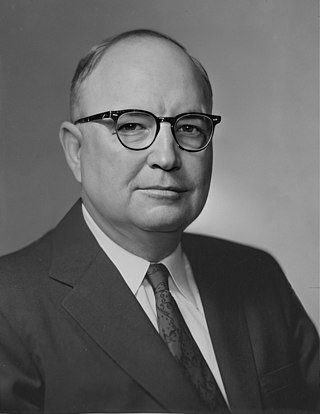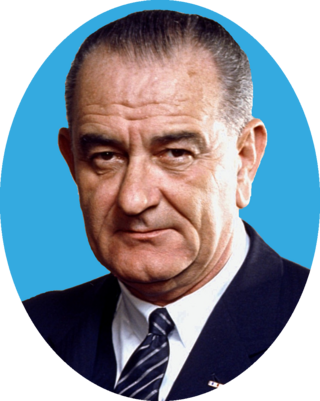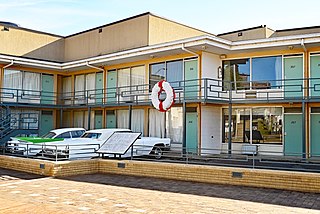
Martin Luther King Jr. was an American Baptist minister, activist, and political philosopher who was one of the most prominent leaders in the civil rights movement from 1955 until his assassination in 1968. King advanced civil rights for people of color in the United States through the use of nonviolent resistance and nonviolent civil disobedience against Jim Crow laws and other forms of legalized discrimination.

The civil rights movement was a social movement and campaign in the United States from 1954 to 1968 that aimed to abolish legalized racial segregation, discrimination, and disenfranchisement in the country, which was most commonly employed against African Americans. The movement had origins in the Reconstruction era during the late 19th century, and had modern roots in the 1940s. After years of direct actions and grassroots protests, the movement made its largest legislative and judicial gains during the 1960s. The movement's major nonviolent resistance and civil disobedience campaigns eventually secured new protections in federal law for the civil rights of all Americans.

James Oliver Eastland was an American attorney, plantation owner, and politician from Mississippi. A Democrat, he served in the United States Senate in 1941 and again from 1943 until his resignation on December 27, 1978. Eastland was a segregationist who led the Southern resistance against racial integration during the civil rights movement, often speaking of African Americans as "an inferior race". Eastland has been called the "Voice of the White South" and the "Godfather of Mississippi Politics".

Ross Robert Barnett was an American politician and segregationist who served as the 53rd governor of Mississippi from 1960 to 1964. He was a Southern Democrat who supported racial segregation.

The March on Washington for Jobs and Freedom, also known as simply the March on Washington or the Great March on Washington, was held in Washington, D.C., on August 28, 1963. The purpose of the march was to advocate for the civil and economic rights of African Americans. At the march, Bob Dylan performed four songs, alongside Joan Baez, and many people gave speeches. The most notable speech came from the final speaker, Dr. Martin Luther King Jr., standing in front of the Lincoln Memorial, as he delivered his historic "I Have a Dream" speech in which he called for an end to racism and racial segregation.

Samuel Ernest Vandiver Jr. was an American Democratic Party politician who was the 73rd governor of Georgia from 1959 to 1963.

John Malcolm Patterson was an American politician. He served one term as Attorney General of Alabama from 1955 to 1959, and, at age 37, served one term as the 44th Governor of Alabama from 1959 to 1963.

The 1964 Democratic National Convention of the Democratic Party, took place at Boardwalk Hall in Atlantic City, New Jersey, from August 24 to 27, 1964. President Lyndon B. Johnson was nominated for a full term. Senator Hubert H. Humphrey of Minnesota was nominated for vice president. The convention took place less than a year after President John F. Kennedy was assassinated in Dallas, Texas, and Kennedy's legacy was present throughout the convention.

Robert F. Kennedy's Day of Affirmation Address is a speech given to National Union of South African Students members at the University of Cape Town, South Africa, on June 6, 1966, on the University's "Day of Reaffirmation of Academic and Human Freedom". Kennedy was at the time the junior U.S. senator from New York. His overall trip brought much US attention to Africa as a whole.

"I Have a Dream" is a public speech that was delivered by American civil rights activist and Baptist minister Martin Luther King Jr. during the March on Washington for Jobs and Freedom on August 28, 1963. In the speech, King called for civil and economic rights and an end to racism in the United States. Delivered to over 250,000 civil rights supporters from the steps of the Lincoln Memorial in Washington, D.C., the speech was one of the most famous moments of the civil rights movement and among the most iconic speeches in American history.

Robert Francis Kennedy, also known as RFK, was an American politician and lawyer. He served as the 64th United States attorney general from January 1961 to September 1964, and as a U.S. senator from New York from January 1965 until his assassination in June 1968, when he was running for the Democratic presidential nomination. Like his brothers John F. Kennedy and Ted Kennedy, he was a prominent member of the Democratic Party and is considered an icon of modern American liberalism.

Martin Luther King Jr., an American civil rights activist, was fatally shot at the Lorraine Motel in Memphis, Tennessee, on April 4, 1968, at 6:01 p.m. CST. He was rushed to St. Joseph's Hospital, where he was pronounced dead at 7:05 p.m at age 39. He was a prominent leader of the civil rights movement and a Nobel Peace Prize laureate who was known for his use of nonviolence and civil disobedience. James Earl Ray, a fugitive from the Missouri State Penitentiary, was arrested on June 8, 1968, at London's Heathrow Airport, extradited to the United States and charged with the crime. On March 10, 1969, he pleaded guilty and was sentenced to 99 years in the Tennessee State Penitentiary. He later made many attempts to withdraw his guilty plea and to be tried by a jury, but was unsuccessful. Ray died in prison in 1998.

The Report to the American People on Civil Rights was a speech on civil rights, delivered on radio and television by United States President John F. Kennedy from the Oval Office on June 11, 1963, in which he proposed legislation that would later become the Civil Rights Act of 1964. Expressing civil rights as a moral issue, Kennedy moved past his previous appeals to legality and asserted that the pursuit of racial equality was a just cause. The address signified a shift in his administration's policy towards strong support of the civil rights movement and played a significant role in shaping his legacy as a proponent of civil rights.

"On the Mindless Menace of Violence" is a speech given by United States Senator and presidential candidate Robert F. Kennedy. He delivered it in front of the City Club of Cleveland at the Sheraton-Cleveland Hotel on April 5, 1968, the day after the assassination of Martin Luther King Jr. With the speech, Kennedy sought to counter the King-related riots and disorder emerging in various cities, and address what he viewed as the growing problem of violence in American society.
Connick v. Myers, 461 U.S. 138 (1983), is a United States Supreme Court decision concerning the First Amendment rights of public employees who speak on matters of possible public concern within the workplace context. It was first brought by Sheila Myers, an Orleans Parish, Louisiana, assistant district attorney (ADA). She had been fired by her superior, District Attorney Harry Connick Sr., when, after receiving a transfer she had fiercely resisted in private conversations with him and his chief assistant district attorney, she distributed a questionnaire to her fellow prosecutors asking about their experience with Connick's management practices. At trial, Judge Jack Gordon of the Eastern District of Louisiana found the firing had been motivated by the questionnaire and was thus an infringement on her right to speak out on matters of public concern as a public employee. After the Fifth Circuit affirmed the verdict, Connick appealed to the Supreme Court.

The second inauguration of Barack Obama as president of the United States was the 57th inauguration, marking the commencement of his second and final term, with Joe Biden as vice president. This is the most recent presidential inauguration where the incumbent president was sworn in for a consecutive second term after winning reelection. A private swearing-in ceremony took place on Sunday, January 20, 2013, in the Blue Room of the White House, followed by a public inauguration ceremony on Monday, January 21, 2013, at the West Front of the United States Capitol in Washington, D.C.

The Baldwin–Kennedy meeting of May 24, 1963 was an attempt to improve race relations in the United States. Attorney General Robert F. Kennedy invited novelist James Baldwin, along with a large group of cultural leaders, to meet Kennedy in an apartment in New York City. The meeting became antagonistic and the group reached no consensus. The black delegation generally felt that Kennedy did not understand the full extent of racism in the United States. Ultimately the meeting demonstrated the urgency of the racial situation and was a positive turning point in Kennedy's attitude towards the Civil Rights Movement.
The Second Emancipation Proclamation is the term applied to an envisioned executive order that Martin Luther King Jr. and other leaders of the Civil Rights Movement called on President John F. Kennedy to issue. As the Emancipation Proclamation was an executive order issued by President Abraham Lincoln to free all slaves being held in states at war with the Union, the envisioned "Second Emancipation Proclamation" was to use the powers of the executive office to strike a severe blow to segregation.
This is a timeline of the civil rights movement in the United States, a nonviolent mid-20th century freedom movement to gain legal equality and the enforcement of constitutional rights for people of color. The goals of the movement included securing equal protection under the law, ending legally institutionalized racial discrimination, and gaining equal access to public facilities, education reform, fair housing, and the ability to vote.

Let Us Continue is a speech that 36th President of the United States Lyndon B. Johnson delivered to a joint session of Congress on November 27, 1963, five days after the assassination of his predecessor John F. Kennedy. The almost 25-minute speech is considered one of the most important in his political career.


















